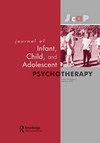The Importance of Affective Neuroscience for Child Psychotherapy
Q3 Psychology
Journal of Infant, Child, and Adolescent Psychotherapy
Pub Date : 2023-02-27
DOI:10.1080/15289168.2023.2178820
引用次数: 1
Abstract
ABSTRACT In this article, I will discuss how affective neuroscience can help us be better child therapists. I will highlight several important contributions of affective neuroscience, especially theory and research on SEEKING, PLAY, separation distress, and the role of positive emotion systems in child mental health. I will describe how these ideas deepen our understanding of healthy and pathological emotional development in childhood and inform our therapeutic work with both children and parents. I will also discuss the importance of feelings of pride and shame – vital aspects of children’s emotional lives that have not yet been extensively studied by affective neuroscience. I will briefly describe an integrative model for child therapy, informed by both psychodynamic theory and affective neuroscience. Our most successful interventions with children and families set in motion positive cycles of healthy emotional and interpersonal experiences – increased confidence and engagement in life and more affirming interactions between parents and children. In this way, we help troubled children and families reclaim some of the joyousness and wonder of childhood.情感神经科学对儿童心理治疗的重要性
在这篇文章中,我将讨论情感神经科学如何帮助我们成为更好的儿童治疗师。我将重点介绍情感神经科学的几个重要贡献,特别是关于寻找、游戏、分离痛苦和积极情绪系统在儿童心理健康中的作用的理论和研究。我将描述这些想法如何加深我们对儿童健康和病态情感发展的理解,并为我们对儿童和父母的治疗工作提供信息。我还将讨论骄傲和羞耻感的重要性——这是儿童情感生活的重要方面,情感神经科学尚未对其进行广泛研究。我将简要地描述一个儿童治疗的综合模型,由心理动力学理论和情感神经科学提供信息。我们对儿童和家庭的最成功的干预使健康的情感和人际体验进入了积极的循环——增加了对生活的信心和参与,以及父母和孩子之间更加肯定的互动。通过这种方式,我们帮助问题儿童和家庭重拾童年的快乐和奇迹。
本文章由计算机程序翻译,如有差异,请以英文原文为准。
求助全文
约1分钟内获得全文
求助全文
来源期刊

Journal of Infant, Child, and Adolescent Psychotherapy
Psychology-Clinical Psychology
CiteScore
1.70
自引率
0.00%
发文量
37
 求助内容:
求助内容: 应助结果提醒方式:
应助结果提醒方式:


